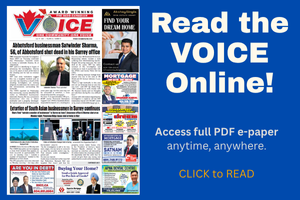Roughly $1 billion in essential goods moves daily on Metro Vancouver’s truck routes
TRANSLINK says it is leading the development of new regional trucking standards that will streamline the permitting process and reduce costs for commercial traffic. This harmonization has been coordinated through local governments and industry representatives. If fully adopted by municipalities across Metro Vancouver, these new standards will make it easier to move goods in the region and bolster national efforts to enhance interprovincial trade.
Until now, transport truck size and weight standards have not been uniform across the region. For example, a truck within a certain size and weight travelling through one jurisdiction hasn’t been allowed to travel on certain routes in another jurisdiction. Trucks have also typically needed separate permits to travel through various municipalities.
These new simplified standards supported by TransLink, which are in the process of being fully adopted by local governments, will ensure consistent rules across municipal boundaries and include:
- Standardizing the definition of “heavy truck” across most local municipalities in Metro Vancouver to vehicles with a Gross Vehicle Weight of over 11,793 kilograms.
- Roughly 98 per cent completed by local governments.
- Aligning oversize and overweight truck standards throughout the region to make permitting more efficient for carriers.
- Nearly 50 per cent completed by local governments.
Transport trucks play an integral role in getting common household items to British Columbians — including food, clothing, critical equipment, machinery, construction materials, and more. They help support grocery stores, retailers, housing, and other infrastructure in the region.
In addition to providing transit services and funding roads and infrastructure in Metro Vancouver, TransLink co-manages the Truck Route Network (TRN) with government partners. The TRN is composed of regional roads designated for heavy truck use.
“As uncertainty around international trade grows, strengthening the local movement of goods directly benefits Metro Vancouver consumers and businesses,” says TransLink CEO Kevin Quinn. “A more efficient transportation network is essential to breaking barriers and creating a stronger economy in our region.”
TransLink is also making the operation of oversize and overweight trucks more consistent by developing a new permit manual to assist carriers and municipal staff. Currently, each jurisdiction issues its own permits which are often subject to different requirements, such as time-of-day travel restrictions. These new standards would improve the regional permitting process; they are expected to be fully adopted over the next year.
As local governments continue working toward industry standardization, these changes should also help reduce transport truck strikes on overpasses and other overhead infrastructure, such as trolley wires, in the region. Such incidents can cause major traffic disruptions and costly damage to infrastructure and cargo.
“These changes will streamline the regional transport process and ensure more reliable cargo movement through Metro Vancouver,” says BC Trucking Association President and CEO Dave Earle. “This important work will refine understanding, compliance, and safety within our industry.”
This work is made possible by the Commercial Vehicle Working Group (CVWG). The CVWG includes representatives from TransLink, the BC Ministry of Transportation and Transit, Transport Canada, local governments, Metro Vancouver, and industry stakeholders — including the BC Trucking Association, YVR, and Vancouver Fraser Port Authority. The CVWG works to harmonize trucking-related definitions, regulations, and permit policies in the region.
More information:
Regional Permit Policies and Procedures Manual
Truck Route Planner









